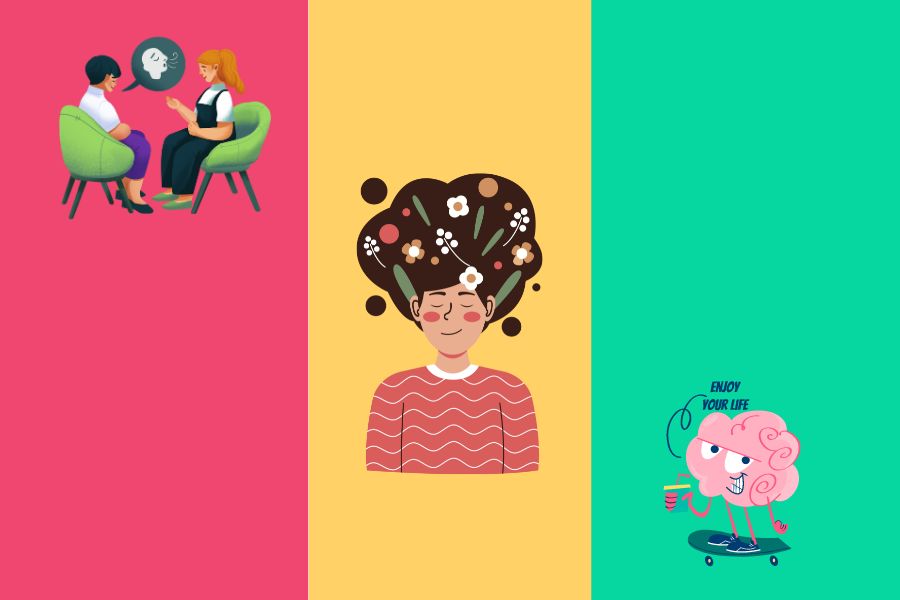How many of you have felt your heart beating faster before your exam or restlessness before receiving any result? This feeling of deep uneasiness, fear or dread is called anxiety. Anxiety, a common and often misunderstood psychological phenomenon, manifests as feelings of worry, nervousness, or unease about a situation with uncertain outcomes. While it is a natural response to stress, when it becomes chronic or overwhelming, it can have profound effects on both mental and physical health. When stress has no negative impact on us and motivates us to do our tasks better, it is called eustress but when it becomes overwhelming for us and we cannot handle our daily functions, it leads to distress.
At its core, anxiety is the body’s natural response to stress, triggering the fight-or-flight response, which prepares us to deal with perceived threats. However, when anxiety becomes excessive or disproportionate to the situation at hand, it can lead to a range of debilitating symptoms.
First and foremost, anxiety can have a significant impact on mental health. Persistent anxiety can lead to various psychological disorders, including generalized anxiety disorder (GAD), panic disorder, social anxiety disorder, and specific phobias. These conditions can interfere with daily functioning, relationships, and overall quality of life. Individuals may experience constant worrying, difficulty concentrating, irritability, and restlessness, among other symptoms. Left untreated, anxiety disorders can worsen over time, leading to more severe complications such as depression and substance abuse.
Moreover, anxiety can take a toll on physical health. The mind-body connection is powerful, and prolonged anxiety can manifest in physical symptoms such as headaches, muscle tension, fatigue, gastrointestinal problems, and sleep disturbances. Over time, these physical manifestations of anxiety can contribute to the development of chronic conditions such as hypertension, heart disease, and weakened immune function. Furthermore, individuals with anxiety may engage in unhealthy coping mechanisms such as smoking, overeating, or avoiding exercise, further exacerbating their physical health issues.
Beyond its immediate effects on mental and physical health, anxiety can also impact various aspects of life, including work, relationships, and social interactions. For example, individuals with social anxiety may avoid social situations altogether, leading to isolation and loneliness. Similarly, those with anxiety disorders may struggle to perform well at work or school, hindering their academic and professional success.
Anxiety also takes a toll on the sleeping pattern and sleep quality of people. Sleep is the basic requirement of a human to maintain its natural balance and to function daily at an optimum level. For individuals grappling with anxiety, achieving restful sleep can be a significant challenge. Anxiety, characterized by feelings of worry, nervousness, and unease, can profoundly disrupt the sleep-wake cycle, leading to a cascade of negative effects on both mental and physical health.
The bidirectional relationship between anxiety and sleep is well-documented in scientific literature. On one hand, anxiety can precipitate sleep disturbances through various physiological and psychological mechanisms. Heightened arousal levels associated with anxiety can lead to increased cognitive activity, intrusive thoughts, and rumination, making it challenging for individuals to relax and initiate sleep. Furthermore, anxiety is often accompanied by physiological hyperarousal, characterized by elevated heart rate, respiratory rate, and muscle tension, which can further impede the transition from wakefulness to sleep.
Moreover, anxiety-related sleep disturbances can perpetuate a vicious cycle wherein poor sleep exacerbates existing anxiety symptoms, leading to a self-reinforcing loop of sleep disruption and psychological distress. Sleep deprivation has been shown to amplify emotional reactivity, impair cognitive function, and compromise stress regulation mechanisms, all of which can contribute to heightened anxiety levels. Thus, individuals with anxiety may find themselves trapped in a cycle wherein sleep disturbances exacerbate anxiety symptoms, which in turn disrupts sleep even further.
Neurobiological research has shed light on the underlying mechanisms linking anxiety and sleep disturbances. Dysregulation of the hypothalamic-pituitary-adrenal (HPA) axis, a key neuroendocrine system involved in stress response, has been implicated in both anxiety disorders and sleep disturbances. Heightened activity of the HPA axis can lead to excess secretion of stress hormones such as cortisol, which not only contribute to anxiety symptoms but also disrupt the normal circadian rhythm of cortisol secretion, thereby compromising sleep-wake cycles.
The combination of anxiety and insomnia can also be caused by hyperthyroidism, a condition where your thyroid is overactive and there’s too much thyroid hormone in your bloodstream. It’s a well-known cause of sleep dysfunction.
Research suggests that anxiety can affect rapid eye movement (REM) sleep. This is the phase of sleep when you tend to have vivid dreams. If you have anxiety, the dreams may be disturbing or turn into nightmares that wake you.
Just as anxiety can affect sleep, sleep can affect anxiety. Sleep anxiety is a common characteristic of insomnia, which occurs when you begin to experience anxiety during the day and evening about poor sleep, which may lead to another night of bad sleep.
Thus, sleep is a very important aspect of our overall well being and compromising it can lead to detrimental consequences. One must take the necessary intervention when they realize that their sleep patterns are becoming unhealthy and contact a healthcare person at the earliest. Slight changes in routine, daily practices and dietary habits can also go a long way in aiding a good sleep pattern. With the right support and treatment, individuals can learn to manage their anxiety effectively and improve their overall well-being. By raising awareness and understanding of anxiety and its effects, we can work towards creating a society that is more compassionate and supportive of those struggling with this common mental health issue.

















